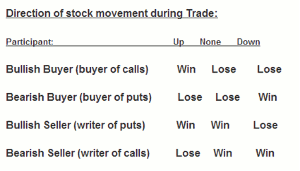Russ Allen of Online Trading Academy analyzes the pluses and minuses of being an option buyer versus being an option writer and outlines when it pays to be which.
When trading most financial instruments, we can decide to buy first and sell later, or sell first and buy later. With things other than options (like stocks or futures), these two positions are symmetrical. The long-side trader (who buys first and sells later) wins if price goes up after he enters the trade. The short-side trader (who sells first and buys later) wins if price goes down. If price goes sideways, it's a draw. Neither side has an inherent advantage or disadvantage.
With options, things are a bit different.
In the first place, with options it is possible to be a buyer and yet to win if price goes down; or to be a short seller and yet be rooting for prices to go up. This is accomplished, of course, by dealing in put options, which increase in value when the related stock goes down (and vice versa). We can also choose to be on the opposite side of either of these trades.
With the two types of options (puts and calls), and the two possible opening positions (buyer and short seller-the short seller is also called the writer), there are four possible combinations.
Here they are, along with the results given the specified direction of stock movement during the trade:
Note that the buyers of options, whether bullish or bearish, win only if the stock goes in their chosen direction, and lose if there is no movement. The short sellers/writers are the winners either if the stock moves in their favor; or if it doesn't move at all.
This might seem like a trivial point. How often does it happen that a stock will literally stay at one price for any length of time? Zero is just one number on the spectrum of all possible positive and negative movements. What difference does it make whose side of the line that one number falls on?
But it is not that simple.
NEXT PAGE: Even More Pluses and Minuses
|pagebreak|The option writer doesn't just win if the stock goes in his favor or stands still. That trader wins even if the stock goes against him, up to a point. The short seller of options does not need the stock to move in his favor in order to make a profit. All he needs is for the stock not to go against him by too large an amount.
This is because the option writer has already collected money at the beginning of the trade, and this provides a cushion. The buyer paid the writer a fixed amount (the option price, or premium), for the chance to make an unlimited profit. If the option buyer wins, he can win big. But this happens pretty rarely. To win, the buyer must correctly anticipate the direction of the stock. The stock must make its move in a substantial amount, for the buyer to win back enough to cover the premium he paid. And that stock movement has to happen in a limited time, before the option expires. Time is ticking away from the moment the buyer takes his position. If the option's time runs out before the move happens, the option will be worthless. And if the move does happen but is too small, the option buyer will recover less than his cost.
So, the option buyer has a small chance of making a big profit, and a better than even chance of losing money, up to and including the whole amount he paid. But at least he can not lose more than that.
Meanwhile, the option writer has a better than even chance of making some money; and a good chance of keeping the entire premium he received.
But things are not guaranteed to go the writer's way. In exchange for the high probability of making some money, he has to accept tradeoffs as well. First, his profit is limited-he can never make more than the premium he collected. Meanwhile, his potential loss is unlimited. Whatever the option buyer makes-if that buyer makes a lucky shot-comes out of the writer's pocket.
So, which do you want to be? The option buyer who stands to make a lot, but probably won't; or the option writer, who usually wins, but might lose big?
If you have read any of my columns before today, you can probably anticipate the answer, which is: it depends.
We want to be the option buyer if:
- We have high confidence in the direction of price movement and timing
- We think the amount of potential price movement is large, and
- We can buy the option cheaply.
On the other hand, we want to be the option writer if:
- We have high confidence in the direction of price movement and timing
- Or we think the stock is very likely to remain in a range, and
- We can sell the option for an inflated price.
Our informed opinion about likely stock price movement comes from our education on technical analysis (reading price charts). Our ability to tell if an option is cheap, fairly priced, or overinflated likewise comes from knowledge of the dynamics of options.
By Russ Allen, Instructor, Online Trading Academy











